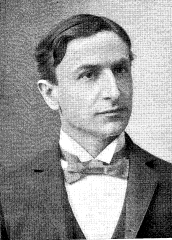| Profile | Major Works | Resources |
Frank A. Fetter, 1863-1949.


American Neoclassical theorist.
Born and raised rural Indiana, Frank A. Fetter enrolled at Indiana
University, but interrupted his studies to help with the family
bookstore business. While working at the bookstore, Fetter came
across the works of Henry George, and decided
to turn to economics. He re-enrolled at Indiana in 1890, where he
came into the orbit of Jeremiah W. Jenks.
After completing his bachelor's degree in 1891, Jenks brought Fetter to
Cornell on a fellowship for his
M.A., then sent him off to Germany. Fetter obtained his doctorate
at Halle under Johannes Conrad in 1894.
Upon returning to the United States, Fetter was promptly appointed to
the faculty at Cornell, before
moving on as professor of economics at Indiana University. Fetter
remained at Indiana until 1898, when he moved to
Stanford. Outraged by the Ross
affair, Fetter resigned from Stanford in 1901, and was immediately
picked up by Cornell, where he
would remain for the next decade. In 1912, Fetter moved to
Princeton.
A friend of Böhm-Bawerk and Wieser, Frank A. Fetter was the foremost advocate of the Austrian School in the United States. An avid opponent of Marshall and the Marshallian school (e.g. 1902), this Cornell and Princeton economist did his utmost to curb the latter's influence in the United States. Although his life's task was the rewriting of a unified theory of distribution which incorporated all factors under the Austrian conception of capital, Fetter also worked on various other topics - such as welfare and monopoly.
Fetter liked to group himself together with Thorstein Veblen and Cornell colleague, Herbert J. Davenport as the "American Psychological School". Convinced that Thorstein Veblen had effectively destroyed utilitarianism, Fetter appealed to the psychological idea of "volition" and "subjective choice" reminiscent of Pareto's approach without the hedonic pleasure-pain calculus. Subjective choice, however motivated, whether by rational calculation or instinctive impulses, led to valuation. His 1904 Principles sought to recast economic theory along the lines of his unique Veblenian-Austrian views.
|
Major works of Frank A. Fetter
|
|
HET
|
|
Resources on Frank Fetter
|
All rights reserved, Gonçalo L. Fonseca
